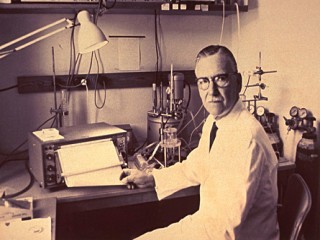
Ulf Von Euler biography
Date of birth : 1905-02-07
Date of death : 1983-03-09
Birthplace : Stockholm, Sweden
Nationality : Swedish
Category : Science and Technology
Last modified : 2022-02-07
Credited as : physiologist and pharmacologist, neurotransmitters, Nobel laureate, Ulf von Euler date of birth
0 votes so far
Ulf von Euler discovered norepinephrine (also called noradrenaline, a crucial carrier of impulses in the sympathetic nervous system) and prostaglandins (the hormones which stimulate muscle contraction and help regulate the cardiovascular and nervous systems).
He studied under Nobel laureates Henry Dale, Archibald V. Hill, and Corneille Heymans, and received the Nobel Prize for Medicine or Physiology in 1970, sharing the honors with the American Julius Axelrod and German-born Englishman Bernard Katz. His father, Hans von Euler-Chelpin, won the Nobel Prize in Chemistry in 1929, and his mother, Astrid Cleve, was a botany and geology professor.
His godfather was Nobel laureate Svante Arrhenius, his maternal grandfather was Per Theodor Cleve, who discovered the elements holmium (Ho) and thulium (Tm), and the famed 18th-century mathematician Leonhard Euler was among his family's ancestors.
His short stay as a postdoctoral student in Dale's laboratory was very fruitful: in 1931 he discovered with John H. Gaddum an important autopharmacological principle, substance P. After returning to Stockholm, von Euler pursued further this line of research, and successively discovered four other important endogenous active substances, prostaglandin, vesiglandin (1935), piperidine (1942) and noradrenaline (1946).
In 1939 von Euler was appointed Full Professor of Physiology at the Karolinska Institute, where he remained until 1971. His early collaboration with Liljestrand had led to an important discovery, which was named the Euler-Liljestrand mechanism (a physiological arterial shunt in response to the decrease in local oxygenation of the lungs).
From 1946 on, however, when noradrenaline (abbreviated NA or NAd) was discovered, von Euler devoted most of his research work to this area. He and his group studied thoroughly its distribution and fate in biological tissues and the in the nervous system in physiological and pathological conditions, and found that noradrenaline was produced and stored in nerve synaptic terminals in intracellular vesicles, a key discovery which changed dramatically the course of many researches in the field. In 1970 he was distinguished with the Nobel Prize for his work, jointly with Sir Bernard Katz and Julius Axelrod. Since 1953 he was very active in the Nobel Foundation, being a member of the Nobel Committee for Physiology or Medicine and Chairman of the Board since 1965.
He also served as Vice-President of the International Union of Physiological Sciences from 1965 to 1971. Among the many honorary titles and prizes he received in addition to the Nobel, were the Gairdner Prize (1961), the Jahre Prize (1965), the Stouffer Prize (1967), the Carl Ludwig Medaille (1953), the Schmiedeberg Plaquette (1969), La Madonnina (1970), many honorary doctorates from universities around the world, and the membership to several erudite, medical and scientific societies.
Dr. von Euler died on 9 March 1983.
















